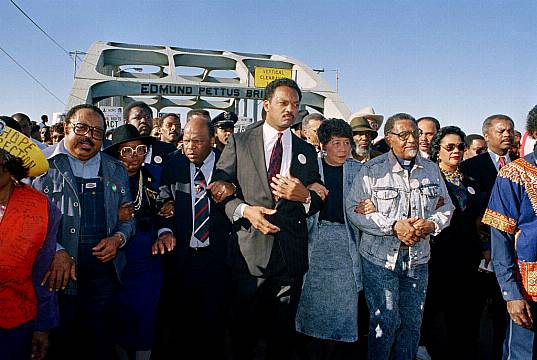The commemoration of a pivotal moment in the fight for voting rights for African Americans has honoured four giants of the civil rights movement who lost their lives in 2020, including US Representative John Lewis.
The Selma Bridge Crossing Jubilee marks the 56th anniversary of Bloody Sunday – March 7 1965 – when civil rights marchers were brutally beaten by law enforcement officers on Selma’s Edmund Pettus Bridge.
Mr Lewis, the Rev Joseph Lowery, the Rev CT Vivian, and lawyer Bruce Boynton were honoured at the commemoration.

Bloody Sunday became a turning point in the fight for voting rights. Footage of the beatings helped galvanise support for passage of the Voting Rights Act of 1965.
This year’s event comes as some states seek to roll back expanded early and postal voting access, and efforts have been unsuccessful to restore a key section of the Voting Rights Act which required states with a history of discrimination to get federal approval for any changes to voting procedures.
Former state Senator Hank Sanders, one of the founders of the annual celebration, said: “Those of us who are still living, particularly the young, need to take up the challenge and go forward because there is still so much to be done.”
The event typically brings thousands of people to Selma. However, most of the events are being held virtually this year because of the Covid-19 pandemic.
The annual Martin & Coretta King Unity Breakfast was held as a drive-in event.

The outdoor event included some in-person speakers such as Rev Bernard LaFayette, and the founders of the group Black Voters Matter. Cliff Albright, one of the group’s founders, spoke about the continued need to fight for voter access.
Others spoke via video link or in pre-recorded messages. US President Joe Biden appeared via a pre-recorded message in which he announced an executive order aimed at promoting voting access.
“Every eligible voter should be able to vote and have that vote counted,” Mr Biden said in the message. “If you have the best ideas, you have nothing to hide. Let the people vote.”
The two newly elected US senators from Georgia – Raphael Warnock and Jon Ossoff – also spoke by video. Mr Warnock remembered Mr Lewis, whom he called both a mentor and an inspiration and spoke about the current conflict over voting access.
The legacy of Selma is that while nothing can stop free people from exercising their most sacred power as citizens, there are those who will do anything they can to take that power away. As we reflect on the anniversary of Bloody Sunday, we must stay focused on the work ahead. pic.twitter.com/DDn1LFfqmi
Advertisement— President Biden (@POTUS) March 7, 2021
“Sadly there are forces at work in our country right now especially in my home state of Georgia who are trying to push back against voting rights,” he said.
Rev Lowery, a charismatic and fiery preacher, is often considered the dean of the civil rights veterans and led the Southern Christian Leadership Conference.
Rev Vivian began organising sit-ins against segregation in the 1940s and later joined forces with the Rev Martin Luther King Jr.
In 1965, Rev Vivian led dozens of marchers to a courthouse in Selma, confronting the local sheriff on the courthouse steps and telling him the marchers should be allowed to register to vote. The sheriff responded by punching Rev Vivian in the head.

Mr Boynton was arrested for entering the white part of a racially segregated bus station in Virginia, launching a chain reaction that ultimately helped to bring about the abolition of Jim Crow laws in the South.
Mr Boynton contested his conviction, and his appeal resulted in a US Supreme Court decision that prohibited bus station segregation.
His case inspired the Freedom Riders of 1961 – a group of young activists who went on bus rides throughout the South to test whether court-ruled desegregation was actually being enforced.
They faced violence from white mobs and arrest by local authorities.







